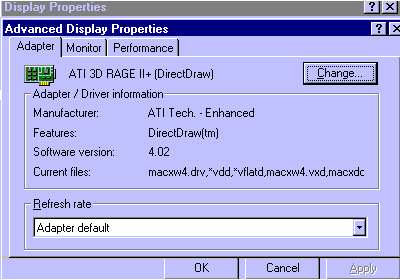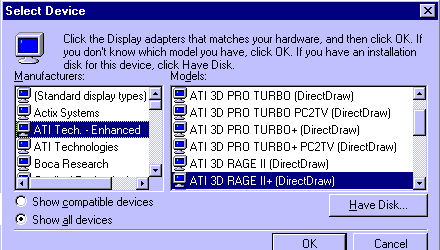

|
58.786 bytes |
Service Hints & Tips |
Document ID: MNOK-3SX2GK |
Aptiva - How to set video adapter and monitor type in Windows 98 or Windows 95 OSR2
Applicable to: World-Wide
Note: This procedure will cover Windows 98 or Windows 95 version 4.00.095 B or the OEM version OSR2. This procedure expects that the monitor and adapter are set up correctly in the BIOS. The correct adapter and monitor types must be known. Consult the user's manual for the system unit or the monitor to get the correct settings. If the documentation is unavailable, consult the manufacturer's electronic support or other technical support to get the correct adapter and files if needed.
Windows 95 Version:
To determine which Windows 95 version is on the machine, right mouse click on the My Computer icon in the upper left of the desktop. On the menu that appears, click on Properties. The System Properties window will come up with the General Sheet in front. If the General Sheet is not in front, click the General Tab to bring it forward. On the upper right side of the window, there will be text which says System, Microsoft Windows 95, and the version. Version 4.00.950 and 4.00.95a are OSR1 while version 4.00.095 B is OSR2. There are slight differences in the video adapter and monitor setups.
1. Click on the start button and go to Settings and Control Panel. Click on Control Panel. The Control Panel Window will open.
2. In the Control Panel Window, double-click on the Display Icon. If the display icon does not show, scroll up using the scroll bar on the right side until the Display Icon is displayed. Double-click on the Display Icon. The Display Properties Window should open.
3. In the Display Properties Window, there will be at least four tabs which say Background, Screen Saver, Appearance, and Settings. Click on the Settings Tab to bring the Settings Sheet forward.
4. At the bottom of the settings sheet is the Advance Properties Button. Click on the button. This should open up the Advance Display Properties Window shown below.

Figure 1 - Advanced Display Properties window
5. In this version, the adapter and the monitor are located on different sheets. There are three tabs which say Adapter, Monitor, and Performance. Click the appropriate tab to bring the adapter or monitor sheet forward. To change the monitor or the adapter, the process is the same.
Adapter:
6. To change the Adapter type, click on the Change button and the Select Device Window will open. Click on the button next to the text Show All Devices and the screen should look like the screen in the figure below.

Figure 2 - Select Device window
7. Scroll down the Manufacturer's list until the Manufacturer's type is selected. Typically, this selection will be ATI, S3 or Cirrus Logic. Click on the manufacturer and the right side should show the video chipsets selections from the manufacturer.
8. On the right side, click on the appropriate chips set. The figure 2 shows the manufacturer ATI Technologies - Enhanced and the chipset is ATI 3D Rage II+ (Direct Draw). Then click the OK button.
9. If there are update drivers on a diskette, insert the floppy into the floppy diskette drive and click the Have Disk Button. A dialog box will appear with A:\ in the text box and the OK button. Click the OK button and the system will find the driver on the diskette and show a dialog box with that adapter. Click the OK button to select the video adapter button to return to the Advance Display Properties Window.
10. At the Advance Display Properties Window, click the OK and the Apply buttons. This will return the screen to a Display Properties Window. Click the Apply button and the setup is complete. The system will have to be restarted for the system's changes to take affect.
Monitor:
11. To change the monitor type, click the Change button and the Select Device Window will open.
12. In the Select Device Window, click the circle next to the text Show All Devices. This should show the Manufacturer and the Models. It should similar to the video adapter's Select Device in Figure 2 above.
13. Select the Manufacturer on the left side by click your monitor's manufacturer. The selections on the right side should change to show the manufacturer's known monitors. Click on the correct model and click the OK button. This will return the computer to the Change Display Type. Click the OK and then return to the Advance Display Properties Window. Click the OK and then the Apply button to return to the Display Properties Window. Click the Apply button which will complete the monitor reset. The computer will have to be restarted to have the new settings take effect.
14. If the monitor is not found, you will have to contact the manufacturer for an appropriate selection. If there is no settings that can be used under the manufacturer selections, the monitor can be set up with generic settings.
15. Generic monitor settings are selected by scrolling up the manufacturer's selection side until (Standard Monitor Types) appears in the manufacturer's list. On the right side, standard monitor types will show up. Consult your owners manual for an appropriate setting. General settings are Standard VGA 640X480 for a 14 inch, Super VGA 800X600 for a 15 inch, and Super VGA 1024X768 for a 17 inch. Do not set the settings higher since these settings are conservative. You will have to consult the monitors manufacturer or the user's manual for appropriate settings.
|
Search Keywords |
| |
|
Hint Category |
Display/Monitor, Video, Windows 95 | |
|
Date Created |
26-03-98 | |
|
Last Updated |
30-12-98 | |
|
Revision Date |
30-12-99 | |
|
Brand |
IBM Aptiva | |
|
Product Family |
Aptiva | |
|
Machine Type |
2136, 2137, 2138, 2139, 2140, 2142, 2153, 2156, 2158, 2159, 2161, 2162, 2163, 2164 | |
|
Model |
E10; E11; E12; E13; E14; E15; E16; E20; E21; E22; E23; E24; E25; E26; E27; E30; E31; E32; E33; E34; E35; E36; E40; E42; E44; E45; E46; E54; E55; E56; E64; E65; E66; ED1; ED2; ED3; ED4; E02; E03; E04; E05; E06; E10; E11; E12; E13; E14; E15; E16; E17; E1F; E20; E21; E22; E23; E24; E25; E26; E27; E2F; E30; E31; E32; E33; E34; E35; E36; E37; E3F; E40; E41; E42; E43; E45; E46; E47; E4F; E50; E54; E64; E74; E84; E51; E53; E61; E63; E71; E73; EV1; EV3; EG1; EG3; E56; E5C; E76; E7C; E2H; E8F; E86; E8C; EL1; EK1; EL2; EK2; EL3; EK3; E80; E81; E82; E83; E48; E57; E58; EQ1; EQ2; EQ3; EV1; EV3; EV5; EG1; EG3; EG6; L17; L27; L31; L35; L37; L3F; L45; L47; L51; L5H; L61; L6D; L71; LG2; LQ1; LQ2; LQ3; LV2; SQ1; SQ2; S34; S35; S36; S44; S45; S46; S57; S61; S62; S67; S6F; S6H; S6S; SG1; SG2; SQ1; SQ2; SV1; SV2; S80; S90; 17R; 18R; 21R; 22R; 24R; 25R; 38R; 460; 461; 462; 471; C3D; C3E; C85; C8E; C8F; C8H; C8M; C8X; C9E; C9F; C9S; C9X; D34; D64; D84; E34 E64; E84; F34; F64; F84; G66; G76; H66; H76; J66; J76; L81; L91; M81; M91; N63; N64; N74; N81; N91; T71; T81; T84; T85; T8B; T8C; T8E; T8F; T94; T95; T9D; T9E; TAE; TAF; 28R; 29R; 30R; 31R; 33R; 35R; 37R; 41R; 54S; 56S; 57S; 58S; B86; B87; B97; D81; D91; E81; E91; G86; G96; G97; H86; H96; P81; P91; Q3C; Q81; Q91; S35; S3C; S8C; S8H; S9C; S9H; S9M; SIB; U81; U91; V86; V96; X8C; X9D; 731; 54Z; 55Z; 702; 732; 734; 736; 73J; 73S; 74S; 70A; 73A; 70V; 73V; 70C; 73C; 240; 270; 301; 311; 500; 241; 244; 271; 274; 242; 252; 272; 282; 243; 273; 248; 249; 349; 508; 247; D1N; D1J; 133; 140; 143; 144; 145; 146; E5N; E5D; EP4; EJ1; EJ2; EJ3; EJ4; EJ5; EJ6; EJ7; EJ8; EJ9; EL3; EL4; EL5; EL6; EL7; EL8; EL9; EM1; EM2; EM3; EM4; EM5; EM6; EM7; EM8; EN1; EN2; EN3; E5U; SE7; E6U; E5F; E5V; E6V; E55; E57; E48; E49; E40; E56; E69; E5Z; E6Z; E68; EPL; EPK; E6K; E6L; E51; E6J; E5A; EPA; E7A; E6A; E5P; E5T; E5H; SEE; SEZ; S8A; E69; E6Q; S4H; S4T; S4P; S6E; S49; S7M; E85; E96; E26; E27; E36; E38; E39 | |
|
TypeModel |
| |
|
Retain Tip (if applicable) |
| |
|
Reverse Doclinks |